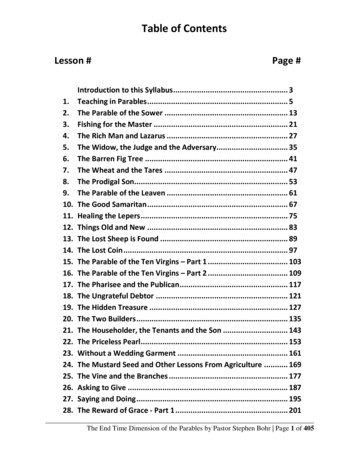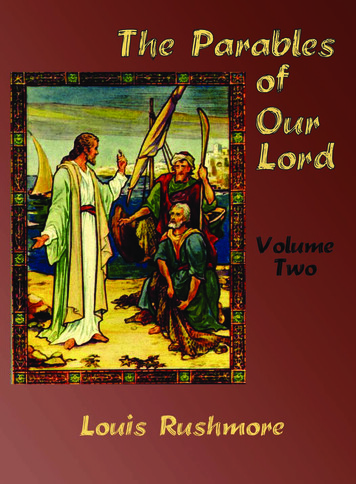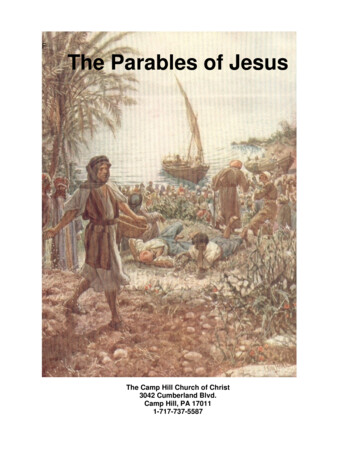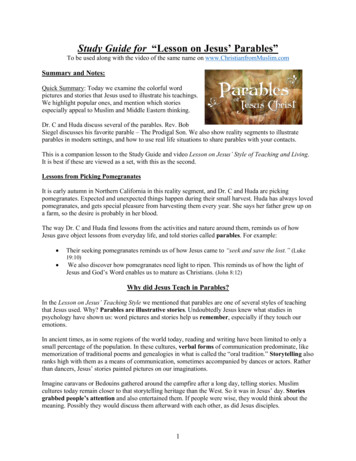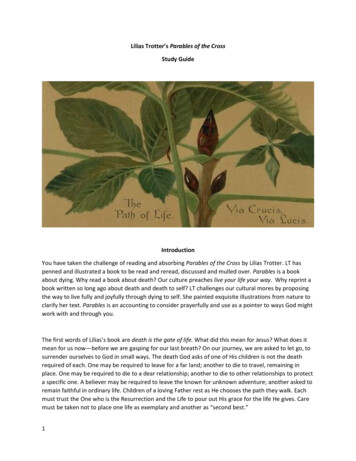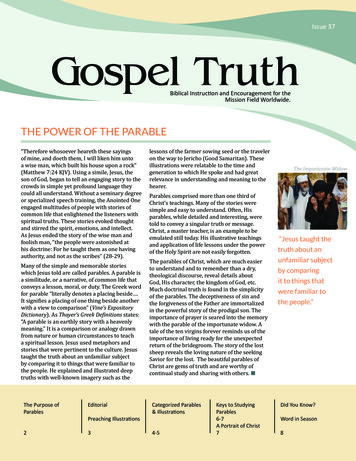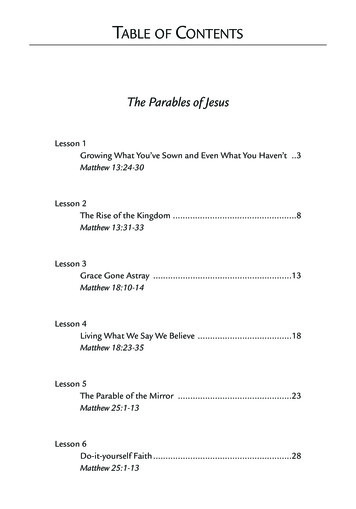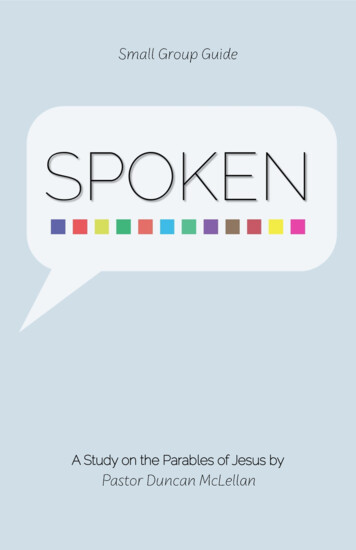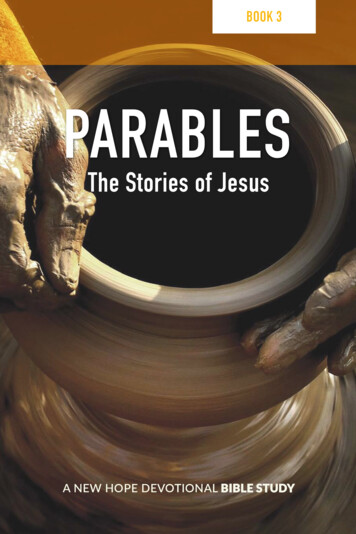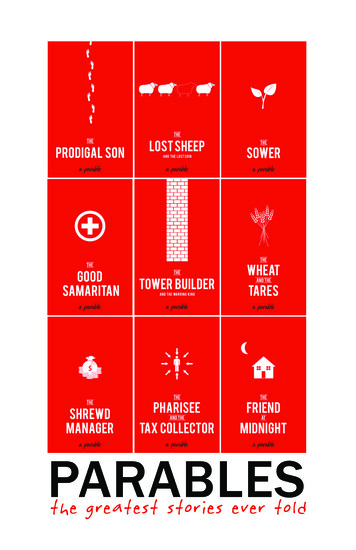
Transcription
Some have defined parables as “stories by which something real in life is usedas a means of presenting a moral thought.” They are usually stories ornarratives taken from nature or from everyday human experiences. Perhapsthe simplest definition of all is that a parable is an earthly story with a heavenlymeaning.Parables are among the oldest and most common forms of teaching. Even theOld Testament contains many parables. One classic example is Nathan’sparable to David about the poor man with one little ewe lamb (2 Samuel 12:110). During His earthly ministry, Jesus used this medium of teaching almostconstantly, and for a very good purpose.Parables are meant to reveal simple, basic truths to those who are seeking tounderstand the Lord’s teaching, not to confuse His teaching with a wide rangeof endless theological speculation. The plain, simple truths contained inparables were meant to be carried away in the mind of the hearer, notexamined under a microscope or dissected to reveal every minute detail.Therefore, as you study these parables look for the simplest explanation first –the general theme of the parable, then delve deeper into sub-meanings orsub-themes.In his closing remarks to the church at Rome, the apostle Paul gives us thispromise:“Now to Him who is able to establish you according to my gospel andthe preaching of Jesus Christ, according to the revelation of themystery kept secret since the world began but now has been mademanifest, and by the prophetic Scriptures has been made known to allnations, according to the commandment of the everlasting God, forobedience to the faith; to God, alone wise, be glory through JesusChrist forever. Amen.” Romans 16:25-27Enjoy your study of the wonderful teachings of Jesus contained in His manyparables. Your knowledge will surely be increased, and your life will truly beenriched.Blessings,Chad Thibodeaux and Don Minter
THEAND THE WARRING KINGREAD Luke 14:28-33“So therefore, whoever of you does not renounce all that he hascannot be my disciple.”- Luke 14:33Do you count the cost before you undertake something important or beforesomething of consequence is about to happen to you? Jesus' twin parable ofthe tower builder and the warring king challenges us to consider whether wecount the cost where it really matters. How are these two illustrations similarand different at the same time? The builder of the tower is free to chosewhether he will build or not.The king whose country is being invaded has no choice but to do something ormeet disaster! Both must carefully think through what they must do and thenface the consequences of their actions. When Jesus calls us to be Hisdisciples, He wants us to be clear about what it will cost us to follow Him. Wemust "renounce" everything, including our very lives, for His sake. He, in turn,offers us a deal we cannot refuse -- unending joy and everlasting life with Godin His kingdom. While we are free to choose whether we will follow Him or not,we must, nonetheless, reckon whether we can afford to refuse His demands.Scripture warns us of the consequences of our choice: we lose what we keepand we gain what we lose.Are you ready to count the cost for following the Lord?“"Lord, you gave Your life for my sake, that I might know the joy andfreedom of life in Your kingdom forever. Help me to count the costand to joyfully embrace Your will for my life."
Daily Bible StudyIn one sense, the thrust of this passage is obvious; in another sense, it issomewhat uncertain. Transparently, the explicit point of the passage is thatanyone who wishes to be a Christian must give up everything. Practically,however, given that conversion makes little change in our family status, ourcareers, or our possessions, how exactly does Jesus expect us to apply thistext? What practical difference does it make for us to believe in Jesus?Monday Describe the events of this parable. In recent events Jesus has been very blunt, to the point, and whatsome might consider even offensive. Why do you think that in verse25 there is still a large crowd following Him?Tuesday How can we reconcile Jesus’ command to love others and Hisapparent calling to hate others? Based on what Jesus says in the passages in Matthew, how can weexplain what He meant in Luke 14:26? Did Jesus mean that Hisfollowers would have to hate the people who meant the most to them? Why was loving Christ supremely a requirement for following Him?Wednesday What does Jesus say are the three bottom-line requirements to beingHis disciple? (See verses 26, 27, and 33) What do you think “carrying your own cross” includes? (v. 27) Read Luke 14:27 and Galatians 2:20. David Platt discusses how all ofyour decisions are no longer yours to make, but rather Christ's.Do you make decisions and then seek God’s approval of them, or doyou look to Christ to make all of your decisions? Over what decisionthat you currently face are you not letting Christ reign?Thursday Read verses 28-30 again. What costs do you think Jesus would sayneed to be counted in today's world? What are the two great endeavors that Jesus gives as pictures ofdiscipleship? How do those illustrate discipleship? (28-32) Read Luke 14:33-35. Was Jesus literally telling His audience to give upeverything they owned for Christ?Friday What does salt have to do with this discussion?
Life ApplicationThe love of God compels us to choose who or what will be first in our lives. Toplace any relationship or any possession above God is a form of idolatry. Jesuschallenges His disciples to examine who they love first. Jesus' way to glory andpower is opposite the world's way of glory and power. The choice is ours, butthe Lord does not leave us alone if we choose to follow Him. Does the love ofChrist compel you to put God first in all you do?Reaching Your OikosAs an aspect of discipleship, God calls us to participate in expanding Hiskingdom. He has supernaturally and strategically placed 8-15 people in yourcircle of influence that He wants to reach through you. Who are these people?1.2.3.4.5.Make a list of them and keep it currentPray for them by name dailyDo life with themInvite them to the Warrior, and/or At the Movies sermon seriesLet God do the restPrayer Journal
The prayer of a righteous person is powerful andeffective. James 5:16
READ Luke 15:1-7“What man of you, having a hundred sheep, if he has lost one ofthem, does not leave the ninety-nine in the open country, and go afterthe one that is lost, until he finds it?”– Luke 15:4Parables, by their very nature, are rooted in the real life experiences of thosewho are listening, and that can be problematic for moderns, long removedfrom the every day experiences of sheep herding. And so the question, “Whatman of you ” leaves us unsure of the answer. “Would the average sheepherder leave ninety-nine sheep unattended, to go searching for that one lostsheep?” Jesus seems to suggest the answer is self-evident. Of course theywould. It was their job to protect the sheep!And therein lies the problem for most of us. Taking care of the ‘sheep’ is notour primary job. As one recent reader proclaimed, “I don’t have any sheep!”Thus, so few of us have thought of sheep care as a primary responsibility. Ourlives are filled with day-to-day activities, few of which are centered around theresponsibility of caring for sheep. And so comes the challenge of Jesus toreconsider our responsibility in caring for each other in the same way asheepherder would care for sheep.By developing an intentional oikos we begin to acknowledge the ‘sheep’ thatGod has given for us to care for in a primary kind of way. It is a first steptoward embracing an oikos ethic into our day-to-day lifestyles. You may soondiscover yourself waking each morning with a deep concern for how each ofyour ‘sheep’ are getting along. And then that startling moment of concernawakens deep within you, when rising in the morning you discover one of yoursheep has gone missing, and you suddenly find yourself consumed with theneed to go find that lost sheep. You unexpectedly discover you have become akeeper of sheep ““Lord, grant me the passion for my oikos that drives me to seekanyone in my oikos that has gone missing. Help me to resist thetemptation to find contentment in the ninety-nine who have remainedfaithful and close at hand ”
Daily Bible StudyIt is doubtful that every person Jesus spoke to concerning the parable of thelost sheep was a sheepherder; nonetheless, they were familiar enough withthe care of sheep that they were able to glean His intent from the teaching.Ultimately, Jesus’ concern was to introduce the ‘ethic’ of the Kingdom of Godinto the lives of folks just like us. As you study this parable this week see if youcan glean the principles of the Kingdom of God and how they ought to impactyour values as you journey along.Monday Who is listening to the parable of the lost sheep? What drove Jesus to tell this parable? Why were the Pharisees and scribes grumbling?Tuesday Why do you think Jesus told a parable about herding sheep? Do you think the average sheepherder would spend time looking forthat one lost sheep?Wednesday How long does Jesus say the shepherd will search for the sheep? What is the significance of placing the sheep on his shoulders to carryit home?Thursday Do you think there are any dangers in leaving the 99 unattended? Whose responsibility is it to care for the 99 left in the open field? Explain why the shepherd calls his friends to celebrate his find? Howmight we do that in the life of the church?Friday Does it surprise you that the parable ends with a reference torepentance? Why do you think Jesus finishes the parable with a reference to ‘thejoy in heaven’? So now that you have settled in on the parable, how do you go aboutlooking for lost sheep?
Life ApplicationDeveloping a functional oikos is critical in becoming a shepherd. Shepherdsknow their sheep. No two are exactly the same (hard to believe isn’t it). Asecond step in carrying for your oikos is getting to know them, each in theirown unique way. Now that you have created your oikos list, take some time toidentify who each person is, not just by name, but by characteristics, likes anddislikes, ways of being and doing.Reaching Your OikosExpand your oikos list to include those notable characteristics of the peopleGod has placed on your heart and mind. Note those characteristics and habitsthat make each person unique. Perhaps most importantly, note how eachperson relates to you, those things that make your relationship unique andvaluable to both you and them. Spend some time praying for God to give youinsights into how to best strengthen your friendship with each person in youroikos.Prayer Journal
READ Mark 4:1-29“The kingdom of God is as if a man should scatter seed on theground. He sleeps and rises night and day, and the seed sprouts andgrows; he knows not how.”– Mark 4:26-27Have you ever shared your faith with someone you love, but it just doesn’tseem to stick? Has the thought of one of your oikos living an eternity withoutChrist caused you to have many sleepless nights? What more can you do?The parable of the sower is a secret of the kingdom of God, and to me it is oneof the most encouraging of all the parables. Jesus is speaking of theecosystem of a conversion. He explains it as a coming to harvest by a patientexpectation that God will work.The key to this parable is, “the seed sprouts and grows, though the farmerdoes not know how.” That is, there are forces at work that will be faithful toperform their work—whether a farmer frets about it or not. Farmers do whatthey can do but then God must work.The same is true with salvation. We do not have the ability as believers to saveanyone in our oikos, but we must consistently plant seeds and rely on thepower of God to bring them unto salvation.This is exactly what Paul describes for us in 1 Corinthians 3:9a: “For we areGod's fellow workers.”One of the most destructive forces at work in the church today is our insistentdemand for instant results. We want to have immediate conversions,immediate responses every time we speak. We tend not to allow time for theWord to take root and grow and come to harvest.““Thank You, Lord that I can trust that as I do my part and sow theseed of Your Word wherever I can, You will do the rest.”
Daily Bible StudyEven though Jesus preached the gospel of the kingdom of heaven, He didn’talways find a receptive audience. And although His miracles and other mightyworks, which He performed, were unmistakably performed by divine power, Hewas still rejected. Some thought Jesus performed these miracles by the powerof Satan. While the people of Jesus’ day had ears to hear, their ears hadbecome hard of hearing, and even though they had eyes to see, their eyes hadbecome blinded to the truth. To illustrate to His disciples that not everyone willbe receptive to the message of the good news, Jesus taught this parable.Monday Describe the events in this parable. Who is the sower, even though the sower is not specifically mentioned(Compare with: Matthew 13:37)? What is the seed (Matthew 13:19a)?Tuesday Describe the first kind of soil mentioned in the parable (the“wayside”). What or who is represented by the birds (Luke 8:12)?Wednesday Describe the second kind of soil mentioned in the parable (the “stonyplaces”). Describe the third kind of soil mentioned in the parable (the seed thatfell “among the thorns”).Thursday Explain how seed falling among thorns is like those troubled by “thecares of this world” (Matthew 13:22b). Explain how seed falling among thorns is like those troubled by “thedeceitfulness of riches” (Matthew 13:22c). Explain how seed falling among thorns is like those troubled by “thepleasures of life” (Luke 8:14).Friday Describe the fourth kind of soil mentioned in the parable (the “goodground”). What kind of fruit are Christians supposed to bear? What does it mean that not all bear the same amount of harvest –“some a hundred fold, some sixty, some thirty” (Matthew 13:23)?
Life ApplicationWe have the privilege of sowing the fertile seed of the gospel. Do we trust thesovereign work of the Spirit to produce a harvest, or rely on our owneffectiveness?Reaching Your OikosCall a close Christian friend today and pray with him/her over their “oikos” list.Partner together and hold each other accountable to inviting them to TheWarrior and At the Movies series in July and August. You can downloadinvitation resources at www.chapinbaptist.comPrayer Journal
READ Luke 15:11-32“And bring the fattened calf and kill it, and let us eat and celebrate.For this son of mine dead, and is alive again; he was lost, and isfound. And they began to celebrate.”– Luke 15:23-24It may be the most well known of all the parables of Jesus, describing theanguish of every parent whose children make decisions most would call lessthan wise. Most difficult of all in those periods of rebellion may be thosemoments when God calls you to simply join the waiting father on the frontporch. Stillness on the front porch can be excruciatingly difficult for those wholove deeply. Nonetheless, even for God, there are those moments calling forpatience as ‘freedom’ exercises autonomy in self-destructive ways. It is theagony every parent dreads.But understand as well that the period of ‘sowing wild oats’ is not withoutconsequences, and some are long lasting. Yet, at some point thoseconsequences may send the prodigal running home. How you receive thoseprodigals as they return is critical to their recovery. Consider how importantthe reaction of the father is to the son as he returns to his home.Once again Jesus reminds us of God’s delight when His children, even thosewildly destructive children, return home. But He also reminds us that noteveryone is pleased to bestow grace on those who return home after wastingthe resources that God provides in life. Thus, the parable is really a storyabout oikos. And oikos is rarely neat and clean. There are often thoseawkward moments when the ‘foolish’ return home seeking grace andredemption. Read this parable carefully and consider how you might go aboutextending redemption and grace toward those who have lived foolishly.““Lord, grant me the wisdom needed to know when to go and searchfor prodigal, and when to simply join my heavenly Father as we waiton the front porch for the prodigal to return home. Grant me as wellthe patience needed to simply pray, sit and wait ”
Daily Bible StudyAs you read this parable throughout the week place yourself in the role of eachof the key characters. Consider what it would be like to be the youngerbrother, the older brother and the father. Chances are that during the courseof your lifetime, you will indeed, experience the three dominant roles in thisparable.Monday How old do you assume the boys in this parable to be? Are you surprised that the father was willing to divide the landbetween the boys? Does the reaction of the youngest son surprise you?Tuesday What does the youngest son do with his inheritance? What does the older brother do with his inheritance?Wednesday Why do you think the father did not go after the youngest son? Why doesn’t the older brother go after the younger brother?Thursday What are the consequences of ‘squandering’ the resources the fatherprovided? What causes the younger brother to return to his senses? Did you anticipate the reaction of the father to his returning son?Friday What do you think is the primary concern of the older brother inregards to his returning brother? Why do you think the older brother never joins the celebration? Evaluate the father’s response to his oldest son. Do you think theolder brother ever accepted his father’s approach to the youngerbrother? What resources do you think the father provided for his younger sonupon his return?
Life ApplicationCaring for your oikos will sometimes call for you to search low and high for thewayward ones. At other times you will simply wait on the porch, sitting by yourHeavenly Father, waiting for the wayward one to return. The key is to knowwhen to engage in the ‘going’ or waiting. And as you might expect, it will takethe insight of the Holy Spirit to discern the difference.Reaching Your OikosExamine your oikos carefully and determine whether or not you haveindividuals who are in a ‘prodigal state’. If not, you may need to expand thescope of your oikos. Once you determine who those prodigals are, spendsome time in prayer seeking discernment as to whom you should go after andwhom you should simply wait on.Prayer Journal
READ Luke 11:1-13And he said to them, "Which of you who has a friend will go to him atmidnight and say to him, 'Friend, lend me three loaves; for a friend ofmine has arrived on a journey, and I have nothing to set before him';and he will answer him from within, 'Do not bother me; the door isnow shut, and my children are with me in bed;I cannot get up and give you anything'?"Luke 11:5-7 RSVPerhaps you well know that strange, sinking sensation when someone asks forhelp and you have not known what to say. Immediately there is a sense ofpressure, almost terror. "What shall I say?" Perhaps a neighbor comes forcoffee and out of it a question arises or a problem is laid bare; perhaps aschool friend stammers out a question as you are walking to school, or a letterarrives with an urgent plea. Perhaps a friend invites you out to lunch and overthe dessert pours out a pitiful tale, or your child brings home a problem fromschool and stands expectantly, waiting for an answer and you ask yourself,"What can I say?"The best you can do is stall and hope for a quiet moment when you can rush toyour Great Neighbor and cry out to him, "A friend has come, and I have nothingto set before him." This happens often, doesn't it? It is out of such moments ofdeep necessity that true prayer is born.When we need Him the most Jesus instructs us to ask and it will be given, seekand we will find, knock and the door will be opened even at the midnight hour.““Lord Jesus, in this moment, we ask that these words may comewith fresh and vital meaning to our heart; that we may see thatthere is a vast and great experience of thy blessing and powerlying before us, waiting for us to step out upon the basis of theyword alone; that there are things we need to ask for and takeimmediately from thy hand, others that we need to seek for, stillothers for which we need to knock and wait, and knock again,knowing that in every case without exception your word is sure,your answer is true. It shall be given, we shall find, it shall beopened. In Jesus' name, Amen.”
Daily Bible StudyWhile most of the parables of Jesus dealt with the theme of the kingdom ofheaven, some are responses to specific questions Jesus was asked by eitherHis disciples or even by His enemies.This parable is Jesus’ response to a question He was asked about prayer byone of the disciples. Luke writes, “Now it came to pass, as He was praying in acertain place, when He ceased, that one of His disciples said to Him, ‘Lord,teach us to pray, as John also taught his disciples.’” (Luke 11:1). Jesus didthree things in answering this request. First, He told them how to pray andwhat we should pray for. Second, He taught a parable which stressed theimportance of being persistent in prayer. Finally, He followed up the parablewith an explanation of what He had intended to illustrate.MondayExamine the following passages and describe the prayer habits of Jesus.a. Mark 1:35.b. Luke 5:16.c. Luke 6:12-13.d. John 17.e. Matthew 26:36-44.f. Matthew 27:46 and Luke 23:34, 46.Tuesday Jesus teaches a lesson on prayer by giving an example of how oneshould pray, and what should be included in that prayer (Luke 11:24). Jesus taught a similar lesson on prayer in the Sermon on theMount. What did Jesus mean by the words “in this manner, therefore,pray” (Matthew 6:9-15)?Wednesday Compare the two lessons on prayer (Luke 11:2-4 with Matthew 6:915). What do these lessons teach regarding how we should pray, andwhat should be included in our prayers?Describe the events of the parable known as “The Friend at Midnight”(Luke 11:5-8).Thursday What does Jesus teach about the importance of persistence in ourprayers (Luke 11:9-10)?Friday What was Jesus trying to tell His disciples in Luke 11:11-13?
Life ApplicationWhat can we expect from God, especially when we recognize that He doesn'towe us anything and that we don't deserve His grace and favor? If a neighborcan be imposed upon and coerced into giving bread in the middle of the night,how much more hospitable is God, who, no matter what the circumstances, isgenerous and ready to give us what we need. Jesus makes a startling claim:How much more will the heavenly Father give! The Lord is ever ready to give usnot only what we need, but more than we can expect. He gives freely of HisHoly Spirit that we may share in His life and joy. Do you approach yourheavenly Father with confidence in His mercy and kindness?Reaching Your OikosHospitality has long been recognized as a centerpiece of Middle Easternculture. The inconvenience of being disturbed and awakened in the middle ofthe night pales in comparison to the shame that would accompany a failure toprovide the required hospitality. This parable displays a level of desperation bythe friend to do anything he can to feed his friend some bread.We have access to the Bread of Life and we all have friends that need to eat ofthis Bread. This week I encourage you to get desperate. Be willing to doanything short of sin to see your oikos come to Christ. Ask. Ask God to begindrawing them unto Himself, and make the official ask to invite your friends tochurch. Seek. Do as David did in Psalms 51 and ask God to search you and toreveal any unclean aspect of your life. Seek out your friends and begin doinglife with them. Knock. Scripture says in Revelation that Jesus stands at ourdoor and knocks and asks to be let in; this week get the boldness and thecourage to go knock on your friends door and initiate positive and encouragingconversation.Prayer Journal
READ Matthew 13:24-40“ but while he was sleeping, his enemy came and sowed weedsamong the wheat and went away. So when the plants came up andbore grain, then the weeds appeared also”– Matthew 13:25-26Many years ago I bought an old home in Indianapolis and began the tediousprocess of remodeling both the home and the yard. The previous owner hadlet the yard run wild and I was having a difficult time determining the flowersfrom the weeds in the flowerbeds. So, I called a landscaping friend to give mea hand. I asked him what I thought was a very simple question, “Can youcome over to my home and point out for me which plants are weeds and whichones are flowers?” His response has stuck with these many years later, “Ohno, I don’t need to come over, telling the difference is really easy. If you like it,it’s a flower, if you don’t like it, it’s a weed.” And with that he proclaimed I nowknew everything I needed to know about flowers and weeds in my flowerbeds.The problem with his insightful information is that you often can’t tell if you likethe plant or not until the flowers actually appear, or don’t appear, dependingon the plant. But, given enough time, you soon discover which plants you likeand which ones you don’t. And so it is in the Kingdom of God. Given enoughtime, you will soon discover which ‘plants’ you like, and which ones you don’t,which ones are ‘wheat’ and which ones are ‘weeds’.I have discovered over the years that friends are a lot like the plants in myflowerbeds. It’s not until those relationships have really matured that I amable to discern who are the keepers (wheat) and who are the non-keepers(weeds). And then comes the really hard part. I have discovered over theyears the power of ‘Grace’ to transform even the nasty weed into the mostbeautiful flower. And that leaves me wondering about the wisdom of everpulling out those weeds in my oikos.““Lord, help me to be patient with the weeds appearing in my oikos.Help me to resist the temptation to plow under the harvest you haveintended out of my frustration with their current condition.”
Daily Bible StudyThe reality of any oikos, like it or not, is the presence of ‘weeds’. And you willinevitably face the temptation to purge your oikos, to cleanse it of those peskyweeds. But such is not the way of Jesus. As you reflect on this parablethroughout the week consider how you can unleash the grace of God into thelives of those ‘weeds’ who live and hang out with the ‘wheat’. Consider howyou might encourage more together time for the wheat and weeds in youroikos.Monday Who is the man sowing the good seed? How did the ‘weeds’ appear in his fields? Who is the enemy in this parable?Tuesday Who are servants of the master who notice the ‘weeds’? What is their solution to the ‘weed’ problem?Wednesday Why is the master careful to not have the ‘weeds’ removed from theharvest field? What is the master’s solution to the problem? Do you think we ever arrive at the harvest time with those in ouroikos?Thursday Do you believe God is able to turn weeds into beautiful flowers(wheat)? What are the inherent dangers of allowing the wheat and weeds togrow together?Friday Are you sometimes tempted to label those in your oikos as wheat orweeds? Is there ever a time when the weeds should be harvested andburned? Why should we use extreme caution before determining anyone to bea weed?
Life ApplicationLet’s admit, like the workers in this parable, we are apt to simply pull out theweeds, those folks who don’t seem to be producing the kind of ‘flowers’ wedesire? But Jesus seems to suggest a ‘divine patience’ with the oikos that Godhas placed in our lives. As you pray for your oikos consider the possibility thatGod is in the business of transforming ‘weeds’ into glorious flowers.Reaching Your OikosReview your oikos and pray new life into the so called ‘weeds’ that God hasgiven you to love and care for. Pray with great intentionality for God to beginfertilizing those relationships in a transformative manner.Prayer Journal
READ Luke 16:1-15"No servant can serve two masters; for either he will hate the oneand love the other, or he will be devoted to the one and despise theother. You cannot serve God and mammon."Luke 16:13 RSVSome time ago I read of a Christian farmer who discovered that his favoritecow had given birth to twin calves. He said to his wife, "You know, dear, I thinkwe ought to give one of these calves to the Lord. We will raise one forourselves and give one to the Lord who has given us this unexpected blessing."She said, "Which one are you going to give to the Lord?" "Well," he said. "Ihaven't decided. We'll treat them alike and feed them the same and when itcomes time to market them, we will decide which one to give to the Lord." Sohe fed the calves, took care of them, and they grew through the summer. Thenone day he came into the house looking miserable, and his wife said, "What isthe matter?" "Oh," he said, "a terrible thing has happened. The Lord's calf hasdied." She said, "But I thought you hadn't chosen yet which one it was." "Oh,yes," he said, "all the time I was thinking that the white calf would be theLord's, and it was the Lord's calf that died." Such moments come asrevelations of where our heart is really centered.This is what Jesus said. "No man can serve two masters; for either he will hatethe one and love the other, or he will be devoted to the one and despise theother. You cannot serve God and mammon." And if we mean to serve God, letus listen to this word of Jesus:“.make friends for yourselves by means of unrighteous mammon, so thatwhen it fails [and it shall] they [the friends made by means of this] may receive[welcome] you into [the enrichment and the enlargement of life of] the eternalhabitations." (Luke 16:9 RSV)““Jesus, thank you for the healing power of this truth in our life.If we have been allowing s
Parables are among the oldest and most common forms of teaching. Even the Old Testament contains many parables. One classic example is Nathan’s parable to David about the poor man with one little ewe lamb (2 Samuel 12:1-10). During His earthly ministry, Jesus used this medium of
